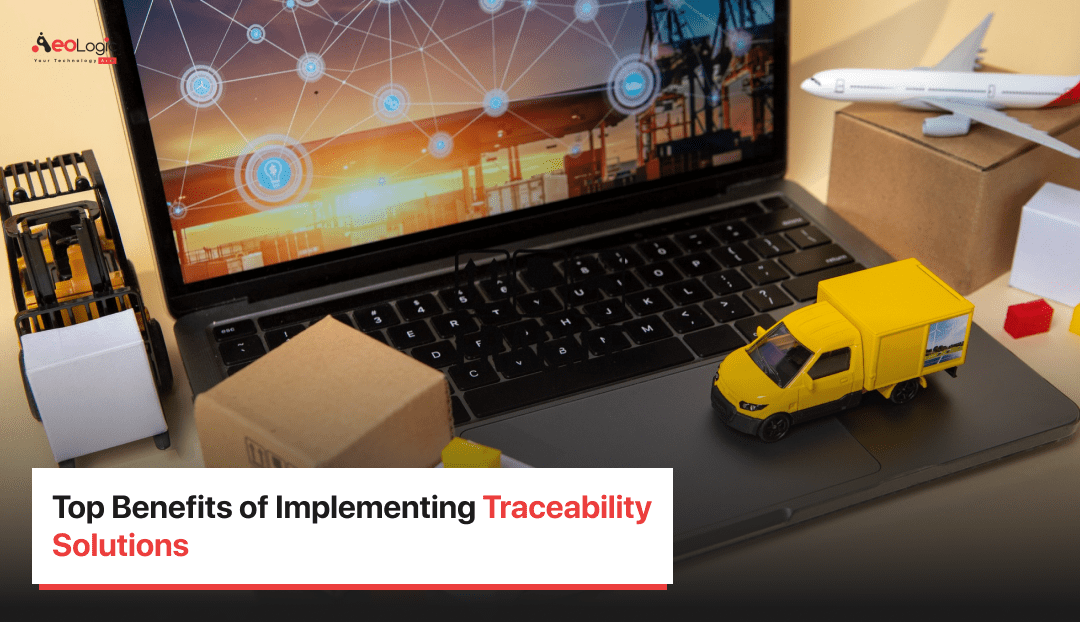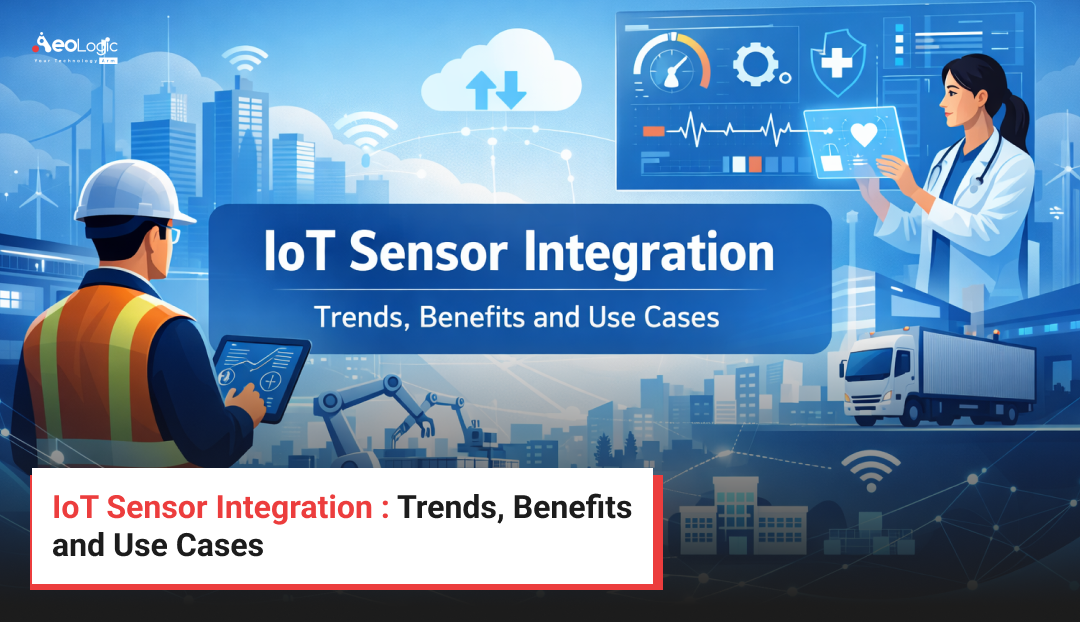Among the top-tier technologies, traceability solutions are some of the most potentially strong technologies that offer numerous benefits for various industries. Traceability solutions generally refer to the solutions or tools that enable real-time tracking, tracing, and visibility for various operations and products. The Compliance And Traceability Solution Market is estimated to be worth 32.68 billion USD in 2025. The Compliance And Traceability Solution Market is projected to grow at a CAGR of 6.56% from 2025 to 2034. These stats show the existence of traceability solutions for the last few recent years.
Many industries, like pharmaceuticals, manufacturing, businesses, retail, food production, logistics, etc., have implemented traceability solutions and are gaining a lot of use cases and benefits with this technology. Traceability solutions with Aeologic, enable real-time monitoring, enhance safety and compliance by detection of analogies at the right time, enable more efficient recall processes, enhance transparency, increase cost efficiency, enhance customer experience towards the organizations, also help to establish sustainability, bring innovation, etc. We will see these benefits in detail as we move forward in the paragraph.
Related Statistics
Many statistics show the existence and impact of traceability solutions for various industries to this day. Here are a few stats mentioned below.
- In a 2018 study by the Center for Supply Chain Studies, 81% of participating organizations agreed that traceability technologies would provide a significant benefit to their business.
- A 2020 study by the Capgemini Research Institute found that 79% of organizations with high supply chain maturity have implemented traceability solutions in their supply chain operations.
- manufacturing companies that have implemented traceability solutions have seen an average increase of 20% in efficiency.
We have seen statistics and statements related to traceability solutions. Now, we are going to see some additional benefits and challenges. Finally, end the topic with a concluding paragraph.
Role of Traceability Solutions in Today’s World
Traceability solutions refer to the systems that track goods from their point of origin to their destination. They are employed to find problems with the distribution, safety, and quality of products and to assist customers in making wise decisions. Real-time visibility and tracking help to gather data that can be used to make analyses of various aspects. Traceability solutions can be developed via various technologies like IoT, RFID, blockchain, etc. There are many other benefits that we will see later in the upcoming paragraph.
Also Read our trending blog: Traceability Solutions for Supply Chains with Examples
Top Benefits of Implementing Traceability Solutions
Like other technologies, traceability solutions also possess some benefits as there are few top benefits of implementing traceability solutions mentioned below.
Faster problem resolution
Problem-solving is a crucial aspect in industries, as this leads to a reduction in downtime. But problem solving is not easy as it needs to know the root cause of problems and manually, it is quite tough. Where with the implementation of traceability solutions, the root cause can be known a few times as it traces every aspect. This helps to solve problems quickly and overall reduce downtime.
Improves research and development
The research and development department is the most important department within an organization. This is very important to provide sufficient data to do research in the proper way and develop quality products. Traceability solutions provide data by identifying patterns, tracking product performance, and suggesting areas for innovation. This overall enhances the quality and productivity of industries.
Minimizing wastages
There can be a situation of wastage of inventory due to not having proper tracking and tracing of inventory stocks. Where with the implementation of traceability solutions, you have store records that enable you to establish economic order quantity for your businesses. This reduces the wastage of inventory that often occurs due to overstock.
Product claims
There are many fraud cases registered nowadays of wrong product claims. But the implementation of traceability solutions eliminates these frauds in a very efficient manner. The traceability helps to track the details of products from manufacturing to point of sale and helps to register the details of products’ warranty and expiry date. This prevents the chances of wrong claims related to the top product.
Increases customer satisfaction
Customer satisfaction is always necessary in every industry, as customers are the main component that buy the products or services. With traceability solutions, customers’ trust gets enhanced because of transparency. Customers are able to know the story behind the manufacturing of a product which gives them relief about any issue.
Also Read: Challenges and Opportunities in the Traceability of Medicinal Products
Challenges In Traceability Solutions
With the lots of benefits, there are a few challenges too that could be faced during the implementation of traceability solutions. Here are a few challenges mentioned below.
- Real-time data management could be an issue, as traceability solutions are not fully capable of managing vast amounts of data from multiple sources.
- Lack of future-proofing can interrupt the implementation of traceability solutions as businesses must ensure that these solutions are compatible for the future too.
- Integration with technology like AI and IoT can be an issue, as this could be complex and costly too.
Also Read: What is Traceability and Its Challenges in Industry
Final words: Benefits of Traceability Solutions
Traceability solutions are arguably one of the best in business, as they enable tracking, tracing, data extraction, etc. A lot of businesses are using traceability solutions, and they got a positive response in many manners. There are many top benefits with traceability solutions, like security improvement, insight availability, faster response to problems, customer satisfaction, reducing waste, etc.
There are a few challenges too, like integration complexity, cost, future-proofing, data management complexity, etc., but for moderate-sized and well-managed industries, this could be one of the best investments. Overall, businesses should think about it, and the one who has already implemented it should make an upgrade with the advancement.
FAQs
How do traceability solutions improve product quality?
Traceability solutions track each aspect of the manufacturing and distribution process, allowing businesses to identify issues proactively. As a result, businesses are in a position to identify defects before the product reaches the consumer. Traceability solutions can track the quality of raw materials and if finished goods are handled properly. Having visibility into the whole process will apply pressure on suppliers and manufacturers to improve product performance, which shall lead to better overall product quality and fewer returns or complaints.
Can traceability solutions help with regulatory compliance?
Many industries operate under strict regulations around product safety and documentation. Traceability solutions track and maintain documentation of every process step, which satisfies regulatory demands and laws, such as FDA regulations, ISO, and others. Because the documentation clearly shows the auditing provisions in operations, it reduces a businesses’ risk of penalties, fines, or investigations due to inspection deficiencies that do not comply with regulatory aspects.
How do traceability solutions enhance supply chain visibility?
Traceability solutions provide real-time tracking of products from production to delivery. Transparency leads to visibility, and visibility means you know exactly where your product is at any given time. Visibility improves inventory management practices, reduces delays, improves collaboration and coordination with suppliers and distributors, and allows for quicker decision making. Transparency also limits risks from theft and loss while stress testing your ability to implement preventative aspects of logistics.
How do traceability solutions reduce costs?
Traceability identifies inefficiencies, waste, or mistakes in production and shipping processes. When issues are discovered quickly, it helps companies avoid costly recalls, returns, and rework costs. It also reduces losses due to theft or getting rid of expired inventory. Ultimately, improved quality and process control will reduce operating costs and increase profits.
What technologies are available in traceability solutions?
Traceability solutions utilize an array of technologies to accurately track products and materials from source to consumable product. All the technologies work together to collect, store, and analyze data to provide excellent visibility along the supply chain, from sourcing raw materials to the final customer doorstep.
Barcodes and QR Codes:
They are the most common and cheapest tracking technologies available. Barcodes and QR Codes are printed and attached to the product or packaging and read at various checkpoints. Each code stores product information such as batch number, date of manufacture, and destination. QR codes provide more data storage than a barcode, where more details can be attached to the product.
RFID (Radio Frequency Identification):
RFID tags operate using radio waves to automatically identify and track items without a line of sight. The RFID technology will speed up scanning lines in warehouses and transportation tracking. It can also help organizations move to a real-time inventory management model and can help eliminate human error.
IoT (Internet of Things) Sensors:
IoT Devices are connected sensors that monitor environmental conditions such as; temperature, humidity, or vibration during transport and/or storage. For sensitive goods like pharmaceuticals or food, IoT Sensors work to ensure the product remains in safe conditions. If the device detects environmental changes that exceed safe thresholds, an alert would be triggered.
Cloud Computing:
Cloud platforms provide safe and secure storage of a lot of traceability data and make it available anytime and anywhere. Cloud solutions allow for one source of truth between suppliers, manufacturers, and distributors, allowing information to flow in real time and across the stakeholders with access to the data.
Artificial Intelligence (AI) and Data Analytics:
AI algorithms leverage significant sources of data from the collected datasets of the traceability systems to identify patterns, foretell risks, and eventually, optimize operations for the supply chain. For example, the predictive analytics data will allow for forecasts of delays, quality issues, or changes in demand to help provide proactive decision making.
The contributions of these elements together form a complete traceability system which provides enhanced product transparency, product quality assurance, regulatory compliance, and efficiency in the supply chain system. Getting the right mix of the technologies will help organizations obtain competitive edges on trust building with their customers and operational excellence.

I’m Deepika Pandey, an SEO strategist and content writer with 6+ years of experience. I create SEO-friendly content that drives traffic and engages readers. I combine data insights with creativity to help businesses grow their online presence effectively.







